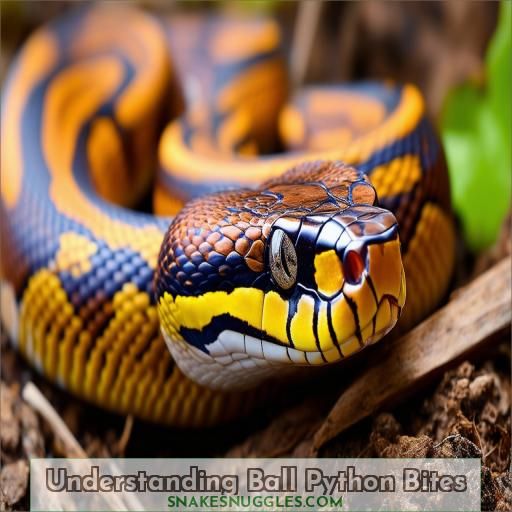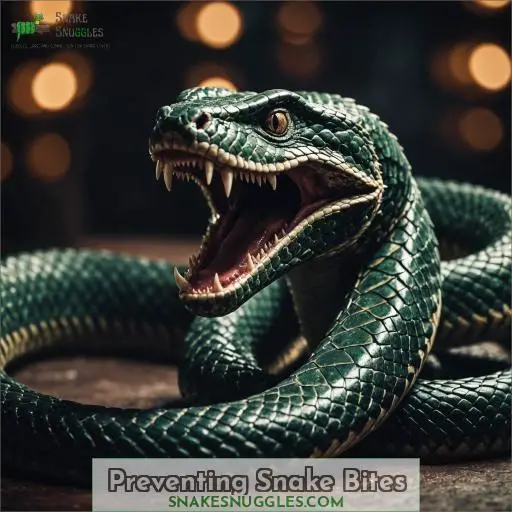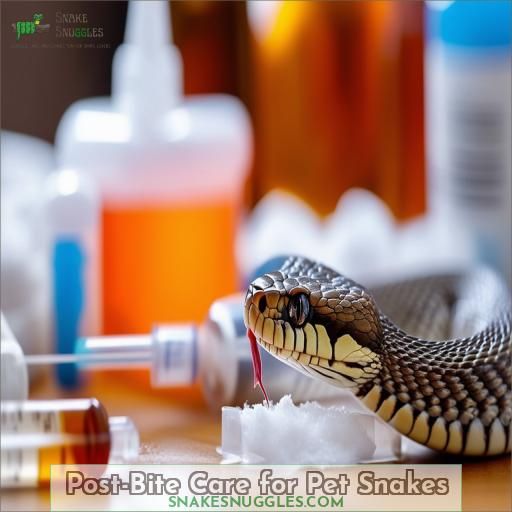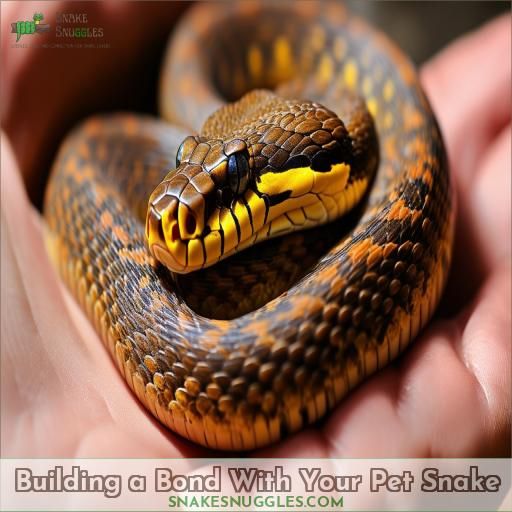This site is supported by our readers. We may earn a commission, at no cost to you, if you purchase through links.
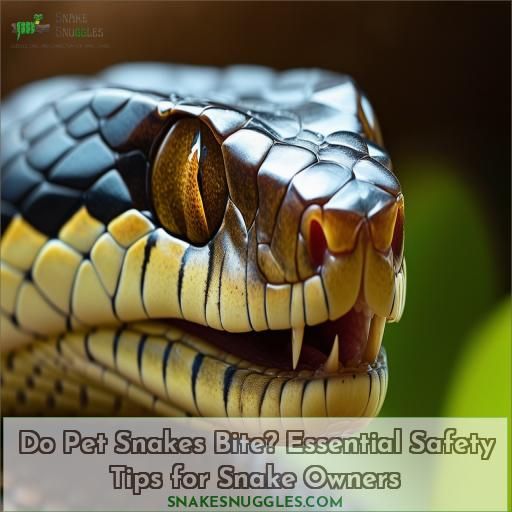 Yes, pet snakes do bite – it’s a natural defensive behavior.
Yes, pet snakes do bite – it’s a natural defensive behavior.
While docile ball pythons rarely bite aggressively, bites can occur due to improper handling, shedding, feeding times, or mistaking you for prey.
Stay alert for warning signs like an S-shaped neck and sudden attention to your hands or feet.
If bitten, clean the wound, apply pressure, and seek medical care as some bites can cause nasty bruises or internal injuries.
But don’t fret – by creating a low-stress environment and bonding through positive interactions, you’ll reduce bite risks a great deal.
To learn essential snake bite prevention and care tips, read on.
Table Of Contents
- Key Takeaways
- Do Pet Snakes Bite?
- Understanding Ball Python Bites
- Preventing Snake Bites
- Post-Bite Care for Pet Snakes
- Building a Bond With Your Pet Snake
- Frequently Asked Questions (FAQs)
- Do pet snake bites hurt?
- Do pet snakes bond with you?
- Are pet snakes friendly?
- Do pet snakes like to be held?
- How can I tell if my snake is about to strike?
- What should I do if my snake bites me?
- Are some snake species more prone to biting?
- How can I train my snake not to bite?
- What are the long-term effects of a snake bite?
- Conclusion
Key Takeaways
- Snakes bite when they feel threatened or startled, so it’s essential to learn their body language and approach them calmly.
- While snake bites can range from minor scratches to severe puncture wounds, seeking immediate medical attention is crucial if bitten, as complications like infection or tissue damage can occur.
- Creating a low-stress environment and building trust through positive interactions, like gentle handling and offering food by hand, significantly reduces the likelihood of getting bitten.
- Just like any relationship, bonding with your snake takes patience, understanding, and respecting their natural behaviors and needs – it’s a delicate dance, but one that can lead to a rewarding companionship.
Do Pet Snakes Bite?
While pet snakes can be docile companions, it’s essential to understand that all snakes are capable of biting, whether intentionally or during feeding. Being aware of the potential reasons behind a bite and recognizing warning signs can help you take preventative measures and proper treatment if a bite occurs.
Reasons for Biting
Pet snakes may bite due to their young age, recent feeding, shedding, scent of prey on your hands, or improper handling. Bites can occur when snakes feel threatened or startled. Avoid hand-feeding and approach your snake slowly to minimize the risk of a bite. Proper care and handling are key to preventing snake bites.
Warning Signs of an Impending Bite
When pet snakes are about to bite, watch for signs such as forming an S-shape with their neck and head, and paying attention to their extremities. (Source)
Their environment and temperament can impact their behavior, especially if they’re young, have recently fed or are shedding, or if they sense prey on your hands.
Understanding these warning signs is essential for snake bite prevention.
Treatment for Snake Bites
If bitten by a snake, clean the wound, apply pressure to stop bleeding, and seek medical attention immediately. Antibiotics may be prescribed to prevent infection. An MRI can detect underlying damage, while surgery may be needed to remove tissue or repair nerves. Stay calm and get help fast for any snake bite.
Understanding Ball Python Bites
Ball pythons are nonvenomous snakes native to West Africa that are known for their docile nature and tendency to form a tight ball shape when feeling uneasy. Their bites, while not venomous, can still cause painful puncture wounds, scratches, bruising, and potential internal damage due to their small inward-sloping teeth and the constricting force they use to subdue prey.
Characteristics of Ball Pythons
Ball pythons are gentle, docile snakes that make great pets. They’re originally from West Africa and form a ball shape when uneasy. Ball pythons capture prey by curling around it. Their small, inward-sloped teeth can cause scratches, puncture wounds, and bruising if they bite. Proper care and handling minimize bite risks.
- Nonvenomous
- Docile temperament
- Require specific enclosure
- Solitary and escape-prone
Ball Python Bite Severity
When a ball python bites, the severity can vary from minor scratches to potentially causing internal damage.
The curved teeth marks might lead to bruising and puncture wounds.
For more severe bites, immediate medical care is essential, potentially involving tissue removal.
Understanding ball python aggression and proper handling is key to prevent such incidents and guarantee the safety of both the snake and the owner.
Common Reasons for Ball Python Bites
Ball pythons may bite for several reasons, including their young age, improper handling, recent feeding, shedding, or the scent of prey on your hands. Avoid startling them, especially if they’re young or hungry. Approach slowly, handle gently, and never let your guard down. Proper care reduces bite risk from ball pythons and other snakes like reticulated pythons.
Preventing Snake Bites
Taking precautionary measures and employing proper handling techniques are necessary for preventing snake bites. Creating a safe environment for your pet snake, complete with appropriate enclosure setup, substrate, hides, and temperature regulation, will minimize stress and reduce the likelihood of defensive behavior that may lead to bites.
Precautionary Measures
To prevent snake bites, always approach slowly and avoid startling the snake. Be attentive to its mood and take proper care to reduce risks. Make sure the snake is in a safe environment, away from potential stressors. Understanding their behavior, feeding regular meals, and avoiding handling during shedding are effective snake bite prevention measures (Source).
Proper Handling Techniques
Proper handling is key to preventing snake bites. Use handling equipment like hooks and tubes. Socialize snakes from a young age. Approach slowly, support their body, and avoid sudden movements. Feed separately from handling to prevent defensive strikes. Provide enrichment like hides and branches to reduce stress. With care and patience, you can build trust with your snake.
Creating a Safe Environment for Snakes
Crafting a secure sanctuary for your slithery companion is paramount. Verify that their habitat fulfills their requirements – appropriate temperature, humidity, and concealment spaces. Maintain a consistent feeding regimen and utilize designated handling instruments. Fortify the enclosure to deter escapes. Routine veterinary examinations preserve their well-being. With these measures, you’ll cultivate a flourishing snake-human bond.
Post-Bite Care for Pet Snakes
If your pet snake bites you, promptly secure the snake in its enclosure to prevent further incidents.
Closely monitor the snake’s behavior, appetite, and overall health, as stress from the biting incident can render the snake more susceptible to illness or other complications.
Seeking professional veterinary care is advisable, especially if the bite appears severe or if the snake exhibits concerning symptoms post-bite.
Immediate Actions After a Bite
If bitten, immediately clean the wound with antiseptic soap and warm water. Apply pressure to stop bleeding. Seek medical attention right away, as snake bites can cause puncture wounds, internal damage, and require antibiotics. Remain calm and get professional help to prevent complications and guarantee proper treatment.
Monitoring Snake’s Health Post-Bite
After a bite, closely monitor your snake for signs of illness or injury. Observe for lethargy, loss of appetite, or abnormal behavior. Maintain their regular feeding schedule and assist with shedding if needed. Consult a reptile veterinarian if you notice any concerning changes to safeguard your snake’s health and safety.
Seeking Veterinary Attention
If your snake bites, seek veterinary care immediately. Antibiotics may be prescribed to prevent infection. MRI scans can detect underlying damage. Tissue, foreign objects, or damaged tendons may require removal or surgical repair. With prompt treatment, your snake will recover safely. Don’t hesitate – your snake’s health depends on it!
| Symptom | Treatment |
|---|---|
| Bite Marks | Clean with antiseptic |
| Puncture Wounds | Apply pressure to stop bleeding |
| Bruising | Bandage affected area |
| Internal Damage | MRI scan to assess severity |
| Infection | Antibiotic medication prescribed |
Building a Bond With Your Pet Snake
Building a bond with your pet snake is essential for a fulfilling ownership experience. You can establish trust through positive interactions that respect your snake’s natural behaviors and needs, such as gentle handling, providing suitable environmental conditions, and learning to recognize signs of stress or discomfort.
Establishing Trust With Your Snake
Building trust with your snake is key. Observe its body language, move slowly, and let it get used to your scent. Offer food by hand to associate you with positive experiences. Frequent, gentle handling during calm periods helps your snake feel secure. With time and care, you’ll forge an unbreakable bond.
Positive Interaction Methods
Positive interactions are key to building trust with your snake. Gently handle your snake regularly using proper techniques like supporting its entire body. Provide a safe, comfortable environment with hiding spots. Avoid startling your snake. Over time, your snake will learn to trust and bond with you through these positive interactions.
Understanding Your Snake’s Behavior and Needs
Understand your snake’s unique feeding habits, enclosure size needs, and shedding frequency to build a strong bond. Approach handling with care, respecting their temperament. Provide a safe, comfortable environment and avoid stressors. With patience and understanding, you can establish trust and enjoy your snake’s fascinating behaviors.
Frequently Asked Questions (FAQs)
Do pet snake bites hurt?
Yes, pet snake bites can hurt. They may cause scratches, punctures, bruising, or internal damage. Proper handling and care minimizes risks, but bites are still possible and potentially painful.
Do pet snakes bond with you?
Yes, pet snakes can bond with their owners through positive interactions and consistent care. While not affectionate like dogs, they’ll recognize you as a source of food and safety.
Are pet snakes friendly?
You’d think snakes would make unfriendly pets, but most are surprisingly docile when properly cared for. With the right handling and environment, many pet snake species can be quite friendly companions.
Do pet snakes like to be held?
Pet snakes generally don’t enjoy being held. While some tolerate brief handling, prolonged physical contact stresses them. It’s best to admire snakes in their enclosure and limit handling.
How can I tell if my snake is about to strike?
You’ll see your snake’s neck form an S-shape and its head raised. It may hiss, flick its tongue rapidly, or stare intently. Stay calm, avoid quick movements, and give it space.
What should I do if my snake bites me?
If bitten, remain calm. Clean the wound with soap and water, apply pressure, and seek immediate medical attention. Antibiotic treatment may be necessary to prevent infection.
Are some snake species more prone to biting?
Yes, some species are more prone to biting. Generally, more docile snakes like corn snakes or ball pythons are less likely to bite compared to more defensive species like rattlesnakes or reticulated pythons.
How can I train my snake not to bite?
By coincidence, the key to training a snake not to bite is consistent, positive reinforcement. Remain calm, use treats, and never punish. With patience and gentle handling, your snake will learn biting isn’t rewarded.
What are the long-term effects of a snake bite?
Long-term snake bite effects can be severe – tissue damage, nerve issues, infection risks. You may need surgery for tendon/bone injuries. Emotional trauma and scarring are also possible impacts to bear in mind.
Conclusion
Like a careful gardener nurturing a delicate plant, understanding and respecting your pet snake’s needs is paramount in mitigating bite risks.
By heeding warning signs, practicing proper handling, and fostering a low-stress environment, you’ll build trust and reduce the probability of bites.
While do pet snakes bite is a valid concern, following essential safety tips guarantees a rewarding bond with your scaly companion.
Remain vigilant yet calm—a harmonious relationship awaits the responsible snake owner.

